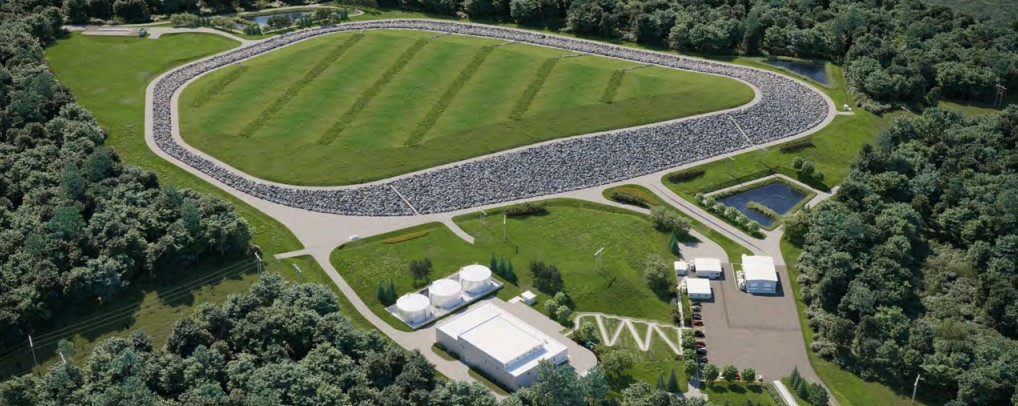Support strong Canadian climate journalism for 2025
An Algonquin Nation is taking Ottawa to court over the approval of a nuclear waste facility near the Ottawa River. The case filed by Kebaowek First Nation this week argues the approval should be set aside or reconsidered and sets the stage for a legal test of how much sway the United Nations Declaration Act (UNDA) holds in Canadian courts.
UNDA is Ottawa’s legislative adoption of the United Nations Declaration on the Rights of Indigenous Peoples (UNDRIP).
In the court application, Kebaowek argues the Canadian Nuclear Safety Commission (CNSC) did not secure the First Nation’s free, prior and informed consent during the licensing process, as mandated by the UNDA.

As soon as the CNSC approved a nuclear waste facility on Jan. 9, Kebaowek First Nation Chief Lance Haymond made it clear they were exploring legal action. Less than a month later, the paperwork has now been filed.
Now, Haymond calls the court challenge a “litmus test for this government to stand up and show First Nations that the legislation is not just another piece of paper,” he said.
UNDA was adopted in 2021 with an action plan released last spring. It remained a contentious bill among many First Nations throughout the process. There were concerns Ottawa had diluted UNDRIP by not giving Indigenous nations a veto over projects, among other concerns.
Haymond told Canada’s National Observer that he’s been an “avid detractor” of the act ever since it was tabled.
“It's essentially a watered-down version of UNDRIP,” he said.
Yet, it is Kebaowek’s court challenge that will now determine how much power UNDA will accord First Nations in Canadian courts. Earlier this year, B.C.’s version of UNDA was cited in the Gitxaała Nation’s challenge to the province’s Mineral Tenure Act. The B.C. Supreme Court ruled in favour of the Gitxaała, however, the judge used a very narrow interpretation of UNDIRP, citing that the province’s act does not implement UNDRIP into domestic law. It’s one of the reasons why the Gitxaała are appealing the decision.
It’s unclear if the B.C. decision will impact Kebaowek’s court challenge, but Robert Janes, Kebaowek’s legal counsel, said the courts are still trying to figure out how UNDRIP works in Canadian law.
Still, “we wouldn’t be bringing this case if we didn’t think there was a very good argument that UNDRIP applies,” he said.
Canadian Nuclear Laboratories, the organization that will manage the proposed waste facility, wants to permanently dispose of one million cubic metres of low-level radioactive waste in the facility as a solution to waste accumulated over the last seven decades of operations and into the future. Concerned groups — citizens, former employees at Chalk River Laboratories, some municipal politicians and all but one Algonquin First Nation — are worried about the proximity to the Ottawa River and do not believe all the waste actually will be low-level.
The Ottawa River (known as the Kichi Sibi in Algonquin) holds immense spiritual and cultural importance for the Algonquin people and is a source of drinking water for millions.
Article 29 of UNDRIP specifically references the need for free, prior and informed consent when hazardous waste will be stored in a nation’s territory.
“The consultation process, however, was flawed from the outset,” the Federal Court application argues. “It was not procedurally fair and did not consider the UN Declaration, Canada’s UNDRIP Implementation Act, or how these instruments might affect the depth and scope of consultation.”

The judicial review application asks the Federal Court of Appeals to reject the CNSC’s decision and declare that the CNSC breached its duty to consult Kebaowek by omitting the obligations laid out in UNDA.
The First Nation has tapped a firm that specializes in Indigenous law. The firm has worked on high-profile cases across several provinces and in the federal courts.
Janes told Canada’s National Observer the case is a familiar story of how Ottawa operates with First Nations, starting with “basic things that undermine the nation’s faith in the way the government of Canada is conducting itself,” he said.
For example, Janes said the CNSC and Canadian Nuclear Laboratories failed to adequately involve Kebaowek in decision-making. A court challenge could have been avoided if Kebaowek had been given time to put their information forward and assistance to understand the project.
“As is often the case, the nation finds itself in a difficult legal fight,” he said.
Meanwhile, Haymond continues to lobby governments about the First Nation’s waste site concerns. Kebaowek leadership recently met with Quebec’s minister of environment and Indigenous affairs.
Two weeks ago, the First Nation called on Environment and Climate Change Canada to disallow permits that would provide the nuclear waste facility exemptions to the Species at Risk Act.

The First Nation has had no response from either the Prime Minister’s Office or the office of Environment Minister Steven Guilbeault, Haymond said. “We’ve had better response from the province of Quebec,” he added. The First Nation is located on the Quebec side of the Ottawa River.
In a separate legal challenge, three citizens’ groups on Wednesday launched a legal challenge to the recent decision by the CNSC to approve the nuclear waste facility.
The groups are asking the Federal Court to review the commission’s failure to consider evidence around radiation dose limits, the types of waste entering the facility and other regulatory exemptions that were granted by the commission.
Natasha Bulowski and Matteo Cimellaro / Local Journalism Initiative / Canada’s National Observer








Comments